15 Ways to Lose Weight Without Exercise

Are you looking to slim down but don't have the time, energy, or ability to exercise? If so, you're not alone. In a recent poll conducted by ARRIS Composites, 65% of U.S. adults want to lose weight this year. And not by a few pounds, either. The average weight loss goal among the 1,000 Americans polled was 29 pounds. However, while exercise is critical for healthy weight management and overall fitness, regularly hitting the gym isn't everyone's cup of tea. That's perfectly understandable, which is why we're here with 15 ways to lose weight without exercise. (And yes—it is possible!)
According to The Heart Foundation, some of the top reasons people don't exercise include fatigue, lack of time, feeling unmotivated, not being able to afford a gym membership, finding exercise boring, and being embarrassed to work out in front of others. So how exactly can you lose weight if you can't summon the energy to work out (or simply don't want to)? To help answer this question, we chatted with nutrition and weight loss experts who share 15 practical ways to lose weight without exercise. Keep reading to discover what they are, and watch that body fat melt away.
Eat a balanced, nutritious diet.
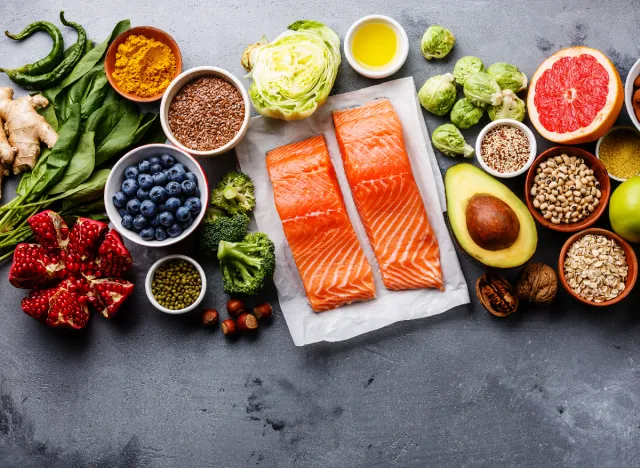
It's no secret that your diet is integral to weight loss. But that doesn't mean depriving yourself of delicious food or being in a significant caloric deficit. Instead, the key to healthy weight loss is eating a variety of nutrient-dense that fill you up without the extra calories. According to WebMD, you can lose weight healthily by eating at a calorie deficit of roughly 500 calories daily.
Trista Best, RD, a registered dietitian with Balance One Supplements, tells Eat This, Not That!, "Consuming a diet rich in fruits, vegetables, lean proteins, and whole grains can help you feel full and satisfied while also reducing calorie intake."
Use smaller plates
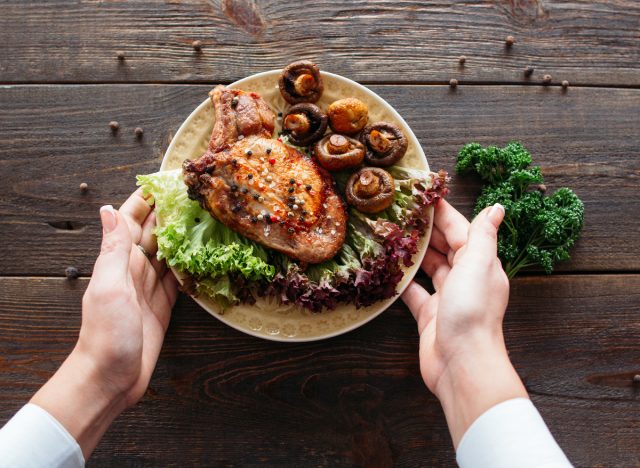
It sounds almost too simple to be true, but serving yourself meals on smaller plates can help you reduce your eating amount and improve your eating habits. For instance, a 2017 study published in BMC Obesity found that smaller plate sizes led to better portion control among participants.
"Many of my clients do this before even changing what they're eating and find it naturally helps them eat less," says Melissa Mitri, RD, a registered dietitian with Melissa Mitri Nutrition. "Doing this can be helpful if you're a member of the 'clean plate' club. If you find it hard not to eat everything on your plate, using a smaller one can reduce your calorie intake without feeling deprived."
Practice mindful eating.

Instead of eating while working, watching YouTube, or scrolling your phone, consider eating more mindfully to give yourself a better chance of reaching your weight loss goals. The Harvard T.H. Chan School of Public Health says mindful eating involves being aware of the emotional and physical sensations you experience while eating. Also, it often involves making your own meals. And according to a June 2022 review, mindful eating is an effective way to support solid eating habits and weight management.
"Pay attention to your hunger cues and eat slowly, savoring each bite," says Best. "This can help you feel more satisfied with less food."
Drink more water.
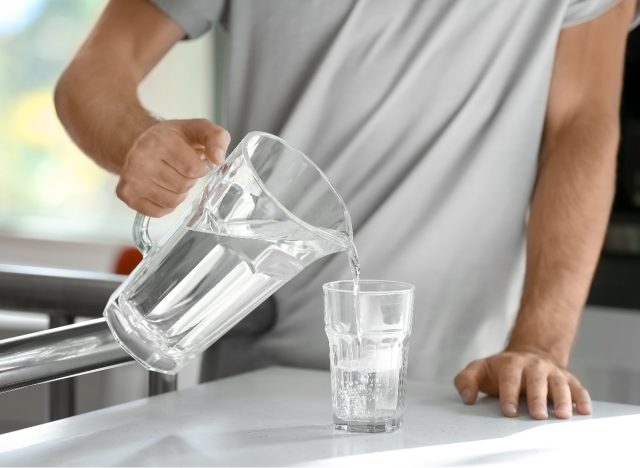
Staying hydrated can support weight loss in several ways. For example, drinking water can act as an appetite suppressant, stimulate your metabolism, and help your body burn fat for fuel, per Johns Hopkins University. Additionally, research shows that drinking a glass of water before meals reduces food intake at the subsequent meal.
"Your brain sends the same signals when you're thirsty as when you're hungry, so it can be easy to mix up these signals," explains Mitri. "Keeping a water bottle on hand at all times can help keep these feelings at bay and keep you physically full."
Get enough sleep.

Regardless of your health or fitness goal, you won't reach it without adequate sleep. A 2022 review published in Nutrients concluded that sleep is critical to weight loss. For example, one study found that individuals who experienced 14 days of calorie restriction experienced less fat loss when they got 5.5 hours of sleep compared to 8.5 hours. This is likely due to the increased production of the hunger hormone ghrelin when you're underslept.
"Poor sleep can disrupt hormones that regulate hunger and satiety, leading to increased calorie intake. Aim for seven to eight hours of quality sleep per night," recommends Best.
Keep healthy foods front and center.

The adage "out of sight, out of mind" is right on the money regarding eating healthy foods. Keeping junk food high in extra calories, added sugars, and unhealthy fats in the house increases the odds that you'll eat them. Conversely, the more you keep healthy foods on hand and readily available, the more likely you are to eat healthily and lose weight.
"If you keep healthy foods around, you'll eat them more often. That way, the next time you're craving cookies, you'll have to push past all the apples and carrots to get to it, making it more of a challenge to eat them regularly," says Mitri.
Manage stress.

Your eating habits are likely to suffer if you're constantly stressed out. Managing any stress you're dealing with is a productive way to lose weight without exercise. According to a 2017 study, stress and negative moods have been associated with over-eating and decreased physical activity—two significant risk factors for weight gain.
"Chronic stress can increase cortisol levels, which can lead to increased appetite and weight gain," says Best. "Practice stress-reducing techniques like meditation, deep breathing, or yoga."
Fill half your plate with veggies.
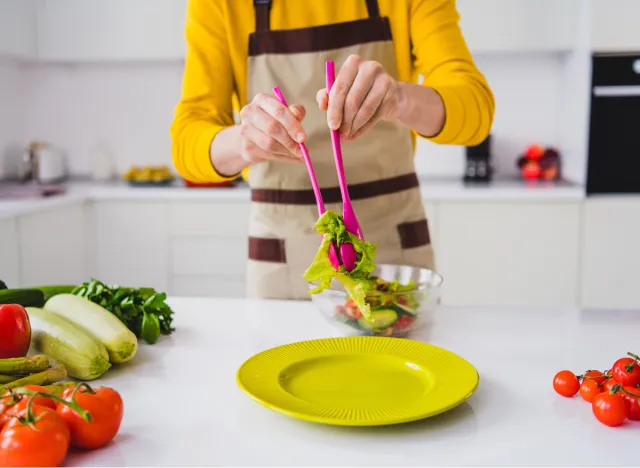
The next time you sit down to enjoy a meal, take a few seconds to look at your plate's food portions. Do veggies make up at least half the meal? Eating more nutrient-rich veggies that are low in calories can help fill your belly without all the extra calories.
"Packing your plate with veggies supplies satisfying fiber and fills you up with a small number of calories. It also leaves less room for higher-calorie foods and lessens the total calorie count of your meal. Better yet, eat the veggies first, and you may naturally eat less of the heavier fare," says Mitri.
Practice portion control.
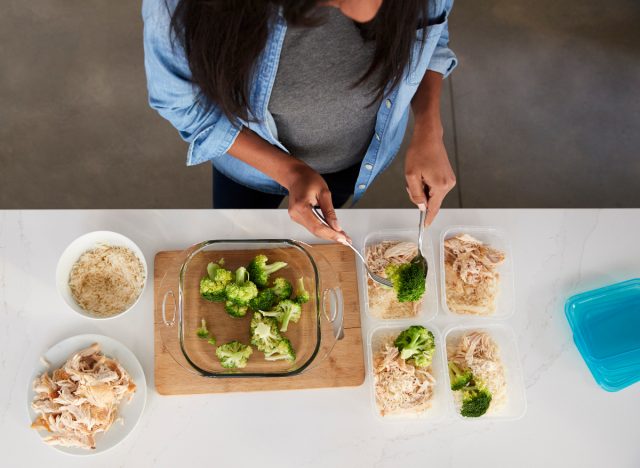
Similar to reducing your plate size, practicing portion control can help support healthy weight loss. Many of us were raised with the idea that you have to finish every last scrap of food on your plate before you're finished a meal, even if you're full. However, eating large portions and past the point of fullness only increases calorie intake and leads to weight gain, research shows.
"Eating smaller, more frequent meals can help control hunger and reduce overall calorie intake," says Best.
Track your food intake.

If you want to lose weight without exercise, track your food intake! Keeping a food diary or using a food tracking app can help you stay accountable and aware of your calorie intake, aiding in weight loss.
"Research shows those who track their food intake tend to hold themselves more accountable to lose weight," Mitri states. "You can track your food via an app, or a good old-fashioned journal. Tracking helps make you more aware of what you're eating and how much and makes you think twice about certain food choices. When you know you have to log that candy bar, you're more likely to ask yourself if it's worth it."
Limit processed foods.
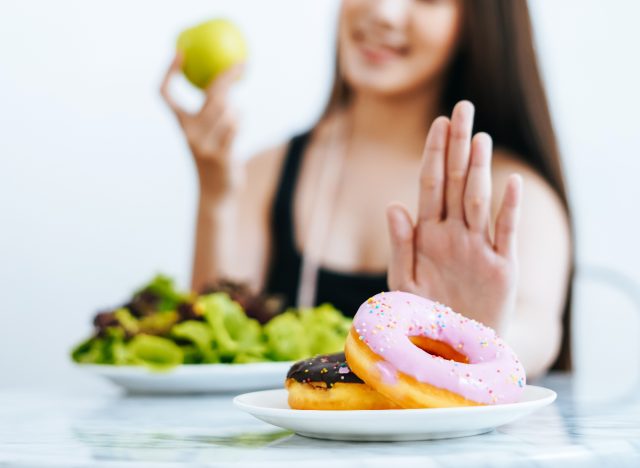
Most processed foods (e.g., breakfast cereals, processed meats, cheese, candy bars, and baked goods) are high in calories, added sugar, fat, and sodium. Research shows that eating too many processed foods can cause weight gain.
"Highly processed foods are often high in calories and low in nutrients and can contribute to weight gain. Instead, focus on eating whole, minimally processed foods," advises Best.
Eat slower.
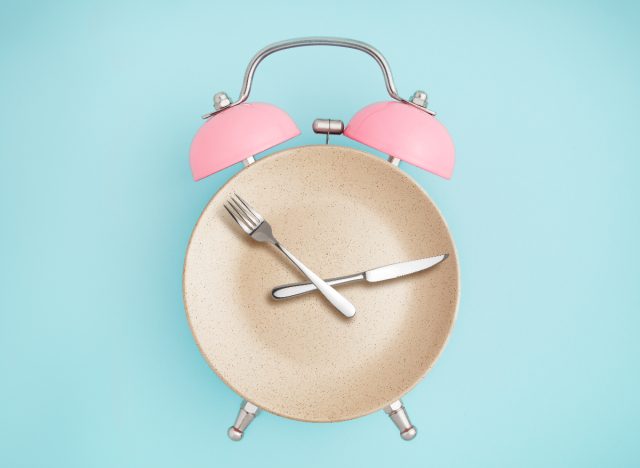
"Set a timer for a minimum of 20 minutes every meal," says Mitri. "According to research, it takes at least 20 minutes for our food to digest. If you're eating for only five to 10 minutes, you're more likely to overeat because you're not giving your body enough time to recognize it's full. I've seen my clients naturally eat less simply from slowing down and without changing what they eat."
In addition, a 2014 study published in the Journal of the Academy of Nutrition and Dietetics found that eating slowly significantly reduced hunger among participants.
Limit alcohol.
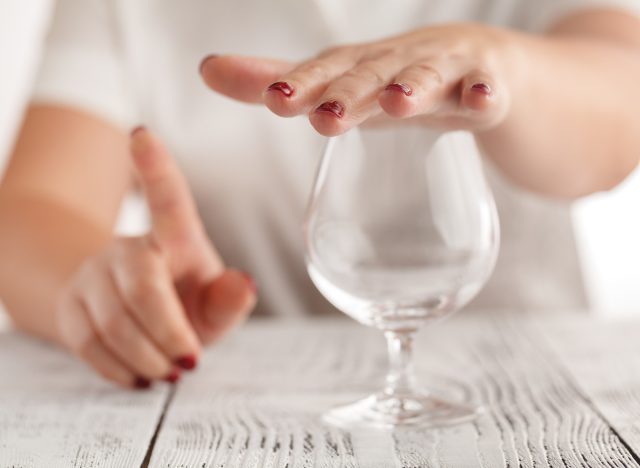
Another great way to lose weight without exercise is by limiting your alcohol consumption.
"Most alcohol is loaded with calories and sugar, which makes it difficult to lose weight," explains Mitri. "Alcohol not only contains plenty of empty calories, but it also may lower inhibitions and increase the risk of overeating and impulsive eating. Limiting alcohol as much as possible and opting for mocktails instead will help the weight to come off more easily."
Don't add cream or sugar to your coffee.

Americans love their coffee. According to a 2022 survey, three out of four U.S. adults drink coffee daily, with 49% reporting they consume three to five cups daily. What's more, another study concluded that two-thirds of individuals who drink coffee add cream, milk, sugar, or other additives that are packed with calories to their daily cups of joe. Add that up over multiple cups daily, and your cup of joe could be a sneaky source of extra calories. Instead, try switching to black coffee to reduce your java's calorie content significantly.
Prepare your own meals.

It's widely known that restaurant, takeout, and fast-food meals are high in calories. That's because, according to BistroMD, restaurants often utilize more salt, sugar, oils, and unhealthy fats than you would at home if you were to prepare your own meals. These extra, unhealthy ingredients are a surefire way to pack on extra weight. So while eating out can be convenient, consider making your own meals if you want to lose weight without exercise. This way, you can control and always know what goes into your food, helping you reach your health and weight management goals.
- Source: https://theheartfoundation.org/2018/06/01/the-top-10-excuses-for-not-exercising-and-solutions/
- Source: https://www.webmd.com/diet/calorie-deficit
- Source: https://www.ncbi.nlm.nih.gov/pmc/articles/PMC5534105/
- Source: https://www.hsph.harvard.edu/nutritionsource/mindful-eating/
- Source: https://pubmed.ncbi.nlm.nih.gov/36045097/
- Source: https://hub.jhu.edu/at-work/2020/01/15/focus-on-wellness-drinking-more-water/
- Source: https://www.ncbi.nlm.nih.gov/pmc/articles/PMC5871210/
- Source: https://www.sciencedaily.com/releases/2022/11/221108082623.htm









